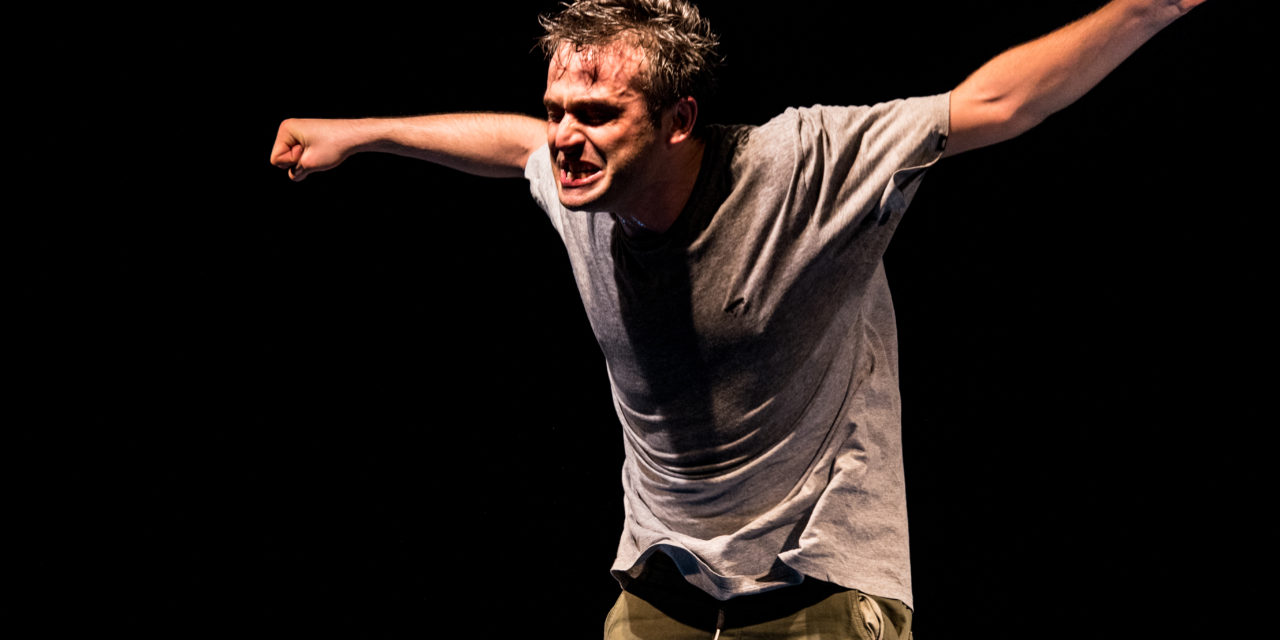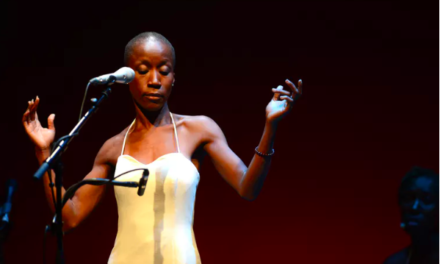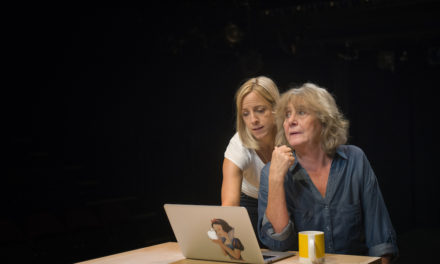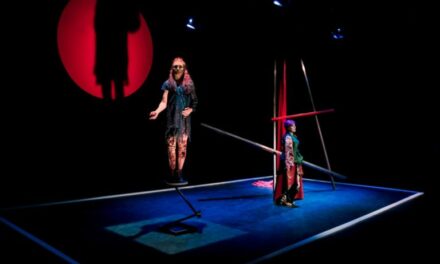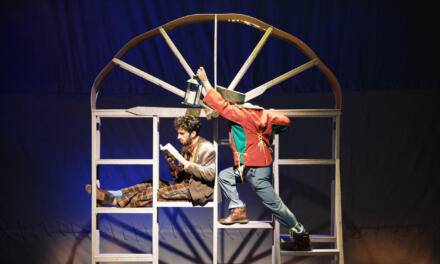In this review, I tried to interview an imaginary well-read friend of mine who is fond of going to theatres with no interest in theatre criticism. Shortly after I started the interview, Sakine (meaning a calm woman) emerged between the lines and made great contributions. Hope she will accompany me in the future!
Handan: It has been several years we have been going to the theatre together. You have almost become a critic after listening to them after the plays. Sometimes I want you to be heard so much. Would you like to talk about any of them?
Sakine: Well, then we should talk Kader Can, I liked the piece very much because it has plenty to say. Let me start with the actor, I am totally impressed. I remember seeing Deniz Karaoğlu on TV series but he is somebody else here. On his own and on an empty space he jumped from one role to another consecutively. Still, you could follow who he was each time. For about 90 minutes he had such a very tough journey among the characters that his t-shirt got soaked in the end! Seeing his endeavor, I did not even blink an eye!
Handan: Indeed, the succession of the scenes was rather abrupt, and Karaoğlu had almost no time between the scenes. Still, he managed to make these shifts very smoothly while singing rap songs at times. It was a very good idea to make this multi-layered, crowded and heavy contented narration lighter through some humorous touches. Karaoğlu managed to balance his stand somewhere in the middle of those tough situation and humor.
Sakine: Have you seen the film Benim Varoş Hikayem/My Suburban Stories? That kind of balanced humor reminded me of that film; at first, you can’t help laughing at all those absurdities, but in time the audience is invited to the sour depths of reality. As for the fast pace of the play, it has something to tell my friends who find theatre really boring. I strongly feel that they will like this piece since it is as brisk as the rap songs he sings.
Handan: Speaking of rap, shall we talk about the subject matter of the play a little bit?
Sakine: I will start then. In this play we come across with the memories of a posthumous boy called Kader Can (meaning Destiny and Soul/Life) who is raised by his mother in a working-class poor suburban area of İstanbul. Since his name (which also designates the play) connotes the names most transvestites take, I thought we would see another play by and about a trans woman. Anyway, Kader Can describes the neighborhood he grew up as follows;
End up by the sea all roads,
Yet seagulls are to be found in dumps,
Bullets find you sitting in your balcony,
Bodies collapse on the ground constantly,
Shame, ban, sin give a hand to mary jane and harlotry
Cops not needed here, desperados only
Street, lane, building, school, mosque and grocer’s
No turning left, stay where you are losers!
Invisible map in your hand, navigate fast, run
Or rot in a dumpster, no tomorrow rascal…
When his time comes to serve, he leaves this neighborhood behind and goes to save his country and to become a man. His first impression about the garrison is as follows;
“Be it tall or short, everybody is a commander to me. Elder brothers, elderly men, birds, bugs, you name it. From now on anyone who walks straighter than I do is a commander!”
Handan: Since he cannot afford to pay and skip the obligatory military service, he is forced to live among a group of people he meets for the first time. Luckily, he does not have a war or a battle trauma, instead, he meets people from all walks of life, most important of which being his encounter to his own life. There he finds time to meditate on his life; past, present, and the future. He even dreams about the time before he was born, what his mom did when his dad died, how she survived and took care of him. Then he sees himself through the eyes of strangers, when he is not appreciated feels excluded and starts behaving unsympathetically. He easily employs all the shallow definitions and adjectives that are used among men in the army.
Sakine: Let’s make what you recently said clearer. University graduates serve for a shorter term and Kader Can feels the distinction and difference between them. Even if they don’t underline this difference Kader Can sees it through their vocabulary, habits, and interests and protests the fact with these words in his rap song;
“what men? Who the hell are you men? You think you’re smart ass men? Putting on airs like that, fuck your school, fuck your job, fuck you all, yo matha fucka!”
The rap world, his comfort zone, where he feels free provides a shelter for him among all those strangers.
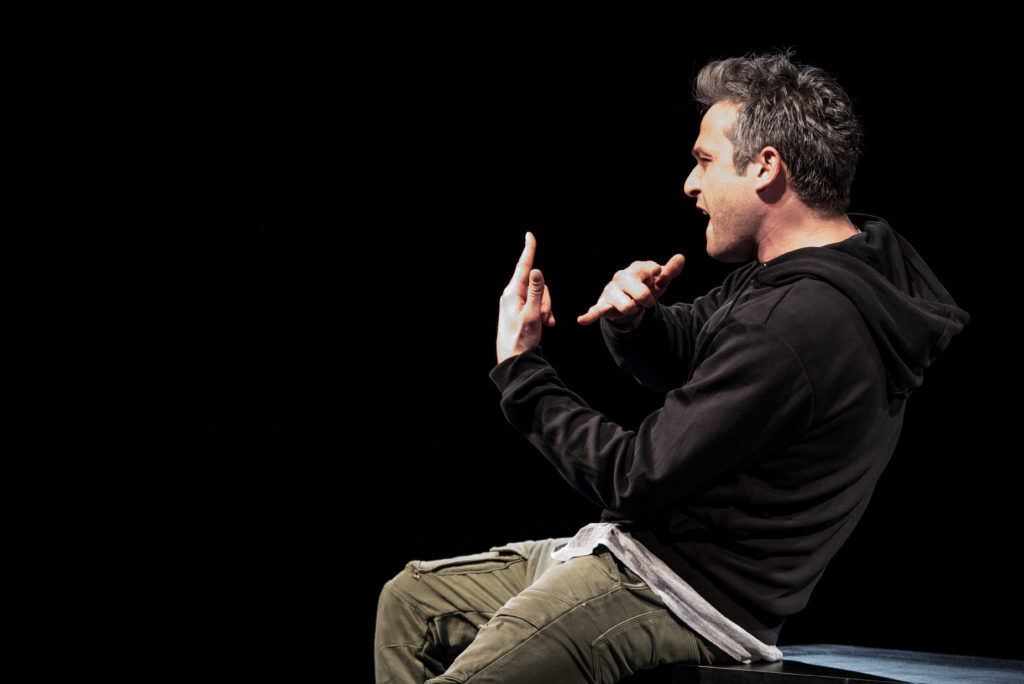
Photo credit: Murat Dürüm
Handan: We can grasp the traces of social structure built upon oppositions and polarizations through Kader Can’s personality and reactions; also his immediate use of oppositions like urban-rural, well educated- low educated, rich-poor, men-women, patriot-traitor is highly related to his position, he is in the army now. The longer he stays in the army where valor, patriarchy, and toughness is overestimated and considered as a prerequisite of being a real “man,” the more Kader Can employs this perspective. While I was thinking over the play the piece of news I came across seemed to be summarizing the recent situation, as well as Kader Can’s;
“Violence by men in this country is directed to everyone, not only towards women. People are communicating through violence now. Manhood has been identified with brutality and pro-war policies are helping this situation go deeper.”
Sakine: This is reflected in Kader Can’s transformation as well. He is immediately preoccupied with traitors, flag, homeland when his sole concern was singing rap songs and his girlfriend Ayla before joining the army. This change is employed almost automatically when he is reminded of military service by his mom. During his service he started to develop an aggressive tone, his discourse gradually covered more violence, became a tougher person, he even broke his mom’s heart and he didn’t even think twice while doing these. Shortly, we can talk about a bandwagon effect in his attitude I guess and this is spread to the time after serving the army I believe. When men talk about the days in the army they seem to be sharing some secret moments with sympathy for each other. Probably they silently share the memories of violence and do not want it to be uncovered. The book named Being A Man Through Creeping (Sürüne Sürüne Erkek Olmak) was about those transformations taking place in men’s lives through different phases, especially in the army.
Handan: I also thought of the same book while watching the play. Upon seeing Kader Can’s hesitations and dilemmas I remembered the obstacles to an affectionate and compassionate approach towards one’s self. He is stuck between his two names as well as the neighborhood he grew up in and the world of rap and this trapped mentality, unfortunately, stands for many people. Living in a world full of obstacles and limitations to be happy and so many worshipping, sacralization to death, I truly and sincerely wished many young people embodied in Kader Can could find a way out.
Sakine: The last few theatre seasons have hosted several plays about women who are pressured, exposed to violence and helpless in front of the whole set of values designed against her. However, this play sheds light on the situation of men in the same surroundings where he is not happy and free either and hints that nobody is able to make a free choice. At times when Kader Can gets out of the mood and language he forcibly adapted, he asks himself;
“Hey, what am I doing here? I love cats, come on!”
That also implies how insidiously comes this discourse of masculinity and violence.
Handan: Well that discourse and its powerful influence is made visible in the actor’s position on stage as well. The platform he sits on represents a bed, a sofa, an armchair depending on his changing environment, mood and people he is interacting. However, the actor never loses his touch with the platform as if there is an invisible string connecting him to it which implies the sheer truth nobody can escape. The only time when he demands his freedom from the platform are the moments when he sings standing. That sheer truth and its heavily felt pressure on characters permeates the audience in a while. We are all held captives there.
Sakine: Do you remember the play we watched last season Sen İstanbul’dan Daha Güzelsin (You Are More Beautiful Than Istanbul)? Actresses looked as if they were stuck to their chairs too.
Handan: That play was also written and directed by Murat Mahmutyazıcıoğlu. The reasons for those three generations of women not being able to move do not fall very far from the ones that stop Kader Can as well. Those characters hardly keep their potential, energy, enthusiasm under control! Still, it is a matter of a moment when they are released.
Sakine: Oh, this reminds me of the song How Is It Gonna End by Tom Waits. We do not know what’s going to happen to Kader Can either. However, he keeps on singing and this means hope–for all of us!
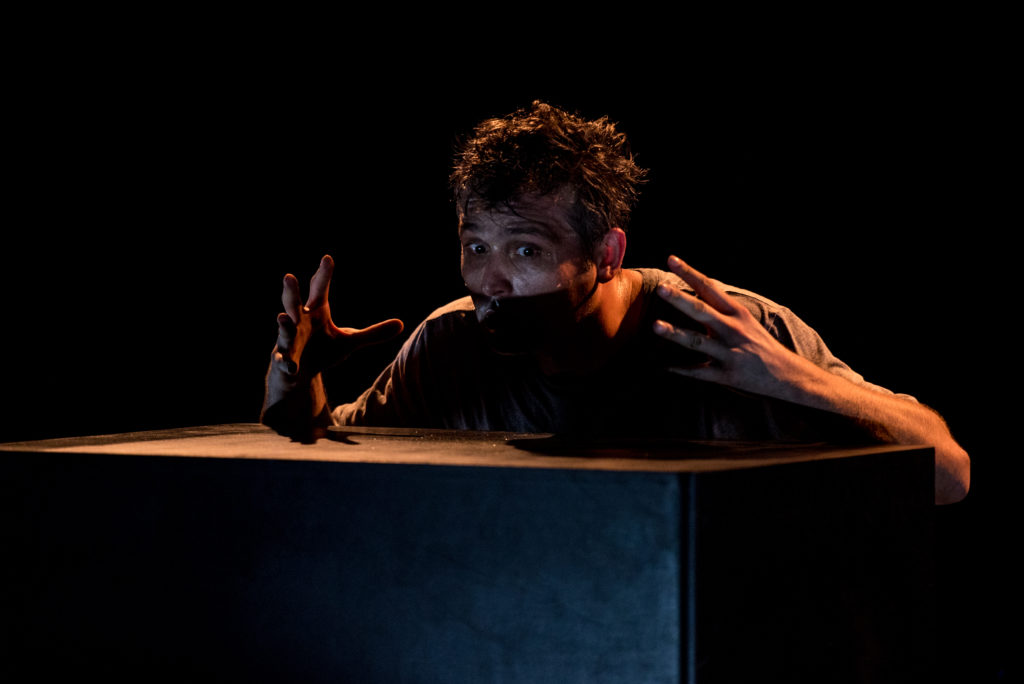
Photo credit: Murat Dürüm
1. The film mentioned above could be seen through the link below;
https://www.youtube.com/watch?v=UNVi4mvp8vQ
3. http://www.tedaproject.gov.tr/EN-92054/1129-being-a-man-through-creeping-surune-surune-erkek-o-.html
This post was written by the author in their personal capacity.The opinions expressed in this article are the author’s own and do not reflect the view of The Theatre Times, their staff or collaborators.
This post was written by Handan Salta.
The views expressed here belong to the author and do not necessarily reflect our views and opinions.

